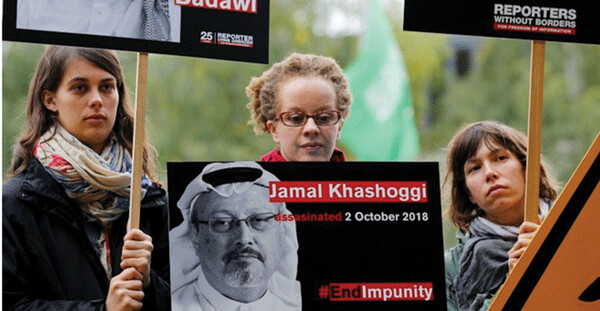Let 2020 be the year to end the murder and imprisonment of journalists

The grisly murder of Washington Post columnist Jamal Khashoggi at the hands of Saudi Arabian operatives inside their consulate in Istanbul on Oct. 2, 2018, reportedly on direct orders of Saudi Crown Prince Mohammed bin Salman, was compounded Monday when the Saudi Arabian public prosecutor announced that five people had been sentenced to death for the crime. Two senior members of the Saudi government, including a close adviser to the crown prince, were released for "lack of evidence." The case of Jamal Khashoggi highlights just how dangerous the practice of journalism can be, especially when elected leaders like President Donald Trump ignore, condone or even inflame hostility and violence against reporters.
Sherif Mansour of the Committee to Protect Journalists (CPJ) responded, saying the announcement "shows that the Saudi government under Crown Prince Mohammed bin Salman is committed to an ongoing mockery of justice."
CPJ defends the right of journalists to report the news safely, without fear of reprisal. Their recent report on journalists killed in 2019 named 25 journalists, the lowest number since 2002. Of those, 10 were murdered directly because of their work as journalists, which is the lowest number since CPJ started keeping records in 1992. Five of the 10 murdered were in Mexico, which is on par with Syria as the most dangerous place to work as a journalist. CPJ still has an additional 25 deaths of journalists under investigation, so the total will likely change.
CPJ also tracks reporters imprisoned around the world, and counts at least 250 currently behind bars. The greatest jailers of journalists in 2019 are China, Turkey, Saudi Arabia and Egypt.
Beneath that grim statistic that 10 reporters were murdered in 2019 lies an important shift toward a public rejection of impunity for violence against journalists. CPJ's Elana Beiser noted in their report three recent cases that define the trend: the October 2017 murder of journalist Daphne Caruana Galizia, in Malta; the 2018 killing of Jan Kuciak and his fiancee in their home in Slovakia; and the Khashoggi case. Both Galizia and Kuciak were reporting on corruption at the highest levels of government in their respective countries when they were murdered.
Recently, as thousands marched in the streets of Malta demanding accountability for the assassination of Galizia, the Mediterranean island nation's Prime Minister Joseph Muscat announced that he will be resigning in mid-January. Public pressure on Muscat increased in part due to a consortium of journalists who continued Galizia's work. The group calls itself "Forbidden Voices." They coordinated the Daphne Project, with 45 journalists pursuing Galizia's unfinished stories and investigating her assassination. Malta's richest man, gambling tycoon Yorgen Fenech, has been charged with complicity in the journalist's murder, and has been arrested in a separate money laundering case. Fenech is also linked to Muscat's former chief of staff.
Similarly, in the wake of the murder of Jan Kuciak and his fiancee Martina Kusnirova, Slovak Prime Minister Robert Fico resigned, and the Slovak businessman who is accused of ordering the murder, Marian Kocner, is finally set to stand trial almost two years later.
Justice for Jamal Khashoggi remains elusive. Agnes Callamard, the United Nations' special rapporteur on extrajudicial, summary or arbitrary executions, tweeted after the announcement of the Saudi convictions: "Bottom line: the hit-men are guilty, sentenced to death. The masterminds not only walk free, they have barely been touched by the investigation and the trial. That is the antithesis of Justice. It is a mockery."
The Washington Post reported over a year ago that the CIA had concluded, on evidence that included intercepted phone calls, that Saudi Crown Prince Mohammed Bin Salman ordered the killing. His close friendship with Donald Trump's son-in-law and senior adviser, Jared Kushner has certainly contributed to the impunity he has so far enjoyed. One way to punish Saudi Arabia is through sanctions and denial of military aid -- options that were open until just last week, when Congress passed, and sent to the White House for Trump's signature, the $738 billion 2020 National Defense Authorization Act. Sen. Bernie Sanders and California Democratic Congressman Ro Khanna issued a joint statement calling the NDAA "a bill of astonishing moral cowardice," in part for failing to deny aid to Saudi Arabia.
The role of a free press is to inform the public and to hold those in power accountable. We all have a responsibility to ensure that journalists are free to do their work, without threats of injury, imprisonment or death.
(c) 2019 Amy Goodman and Denis Moynihan • Distributed by King Features Syndicate
